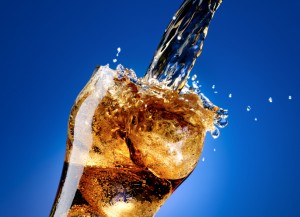 Obesity-related diseases now are responsible for almost 10 percent of United States medical spending, an estimated $147 billion per year–and that does not take into account the cost of lost worker productivity, which is estimated at more than $73 billion per year. With the mounting evidence of how high-calorie, low nutrient foods and beverages are adding to our expanding waistlines, it’s no wonder that soda-makers are feeling under attack. But is it going too far for these corporations to sue U.S. public awareness campaigns that are trying to warn consumers about the harms of sugary drinks?
Obesity-related diseases now are responsible for almost 10 percent of United States medical spending, an estimated $147 billion per year–and that does not take into account the cost of lost worker productivity, which is estimated at more than $73 billion per year. With the mounting evidence of how high-calorie, low nutrient foods and beverages are adding to our expanding waistlines, it’s no wonder that soda-makers are feeling under attack. But is it going too far for these corporations to sue U.S. public awareness campaigns that are trying to warn consumers about the harms of sugary drinks?
Apparently not.
According to a recent article, attorneys for the soda industry have filed several document requests with public agencies from California to New York, saying that it is defending its products from “baseless” attacks. They are requesting documents related to the science behind agencies’ campaigns that claim that soda contributes to obesity. In July, the American Beverage Association (ABA) sued a major player in the efforts to fight obesity – the New York City’s Department of Health and Mental Hygiene. A spokesman for the ABA says the city withheld documents it sought through the Freedom of Information Act.
The public agencies are being buried by these requests. Matias Valenzuela, who is a public education coordinator for the King County Public Health Department in Seattle, was quoted in the article. He estimated that it would take 750 hours over nine months to respond to the ABA’s requests about its sugary beverage education campaign. Anti-obesity advocates are comparing the requests to the ploys of Big Tobacco, calling it an effort to overwhelm government employees, who already have too much on their plates.
We asked Dr. RoseMarie Jones, expert bariatric surgeon at Community Hospital North Bariatrics in Indiana to comment on the article. She said: “Drinking soda has been a part of the American lifestyle for decades. Interestingly the steep rise in consumption of cola parallels the same rise in dental caries as well as obesity percentage in the last 20 years. We added insult to injury with super-sized quantities and ‘frozen coke’ types, as well as the more recently popular energy drinks.”
She told us that many beverages promoted as healthy drinks actually contain huge amounts of sugar, so label reading is essential to get past the label implications. “No wonder we are seeing a 3 x increase in childhood/adolescent diabetes,” Dr. Jones concluded.
As Dr. Jones pointed out, childhood/adolescent diabetes is on the rise. Many children are drinking soda and sugary beverages daily – a risk factor for diabetes. A recent study found that while teens are drinking healthy beverages, such as water, low-fat milk, and 100% fruit juice, they are also consuming too much soda. The study, published in the June 17 issue of Morbidity & Mortality Weekly Report, found that from a study group of 11,429 high school students, 24.3% drink a soda every day, 16.1% consume a sports drink daily, and 16.9% drink another type of sugar-sweetened beverage daily. With the average American already consuming more added sugar than is recommended, drinking these beverages daily is putting these teens at risk for obesity and a host of other diseases.
Sugar is the principal ingredient in soda that is considered to responsible for fueling weight gain and risk for diabetes. Want to see just how much sugar is in your favorite beverage? See how it compares to other beverages here.






Nutrition & Lifestyle